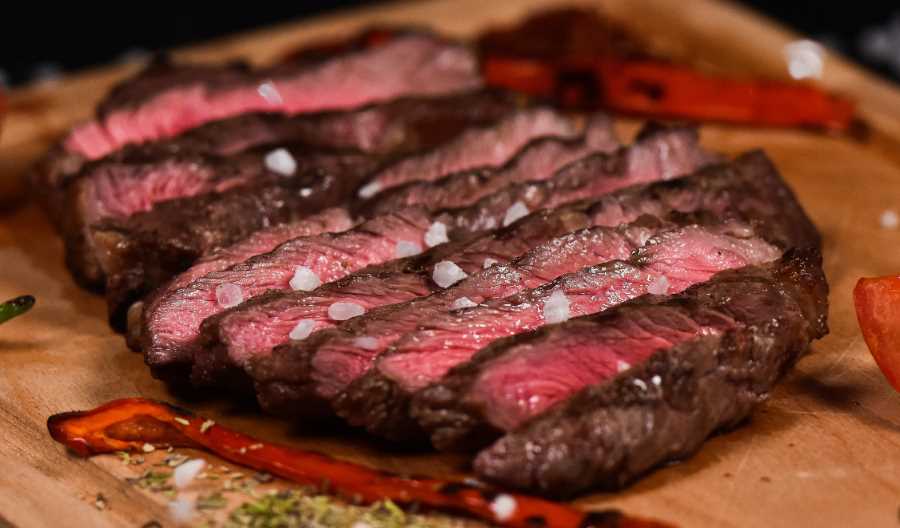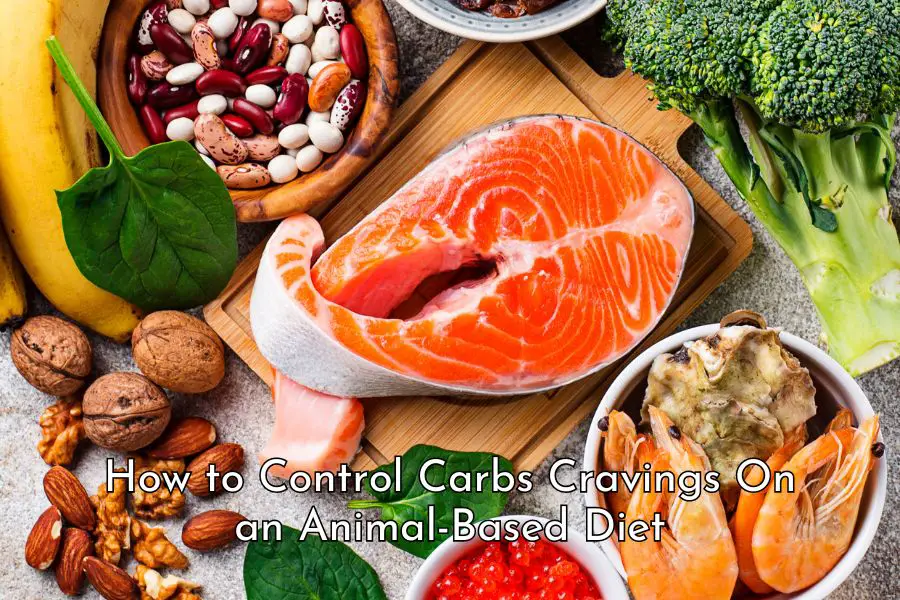This post covers the common adaptation symptoms that you might experience when transitioning to the carnivore diet and how to deal with them.
Some of the adaptation symptoms can be very unpleasant such as carb cravings, diarrhea, constipation, fatigue, or intense headaches.
However, these are all part of a natural adaptation process and, in most cases, there is nothing to worry about. These symptoms are temporary and most of them will be gone after a few days to a few weeks, depending on your health conditions and the diet that you are on before carnivore.
What you are experiencing during the first couple of weeks on the carnivore diet is similar to going to the gym for the first time: your whole body will hurt for days afterward. However, experienced gym-goers will tell you that this is normal and expected. If you stick to a regular routine and don’t give up too quickly, your body will adapt, and you will soon see the benefits of your efforts.
Please note that the information and recommendations below are based on my own research and experience and should be used for reference purposes only. If you have any health conditions, please consult with your physician before making any changes to your diet and lifestyle.
Common Adaptation Symptoms When Transitioning to the Carnivore Diet
The potential adverse symptoms that you may experience while adapting to the carnivore diet include:
- Carbs cravings
- Fatigue
- Diarrhea
- Constipation
- Bad breath
- Night sweat
- Muscle cramp
- Gout flare
- Histamine intolerance.
The number and the severity of those symptoms will depend on the diet you are on before, your health conditions, and your transitional approach.
If you come from a ketogenic background and are already fat-adapted, you might experience fewer and less severe symptoms.
If you come from a standard Western-style diet with a high carbs intake, you might experience more adverse symptoms that may last for a longer period of time.
If you take a gradual approach to the carnivore diet by slowly cutting out plant-based food and increasing your meat intake accordingly, you may experience fewer symptoms with less severity.
If you take a drastic approach and cut out all plant-based food at once and you’ve previously been on the standard Western-style diet, you are likely to experience most of the above symptoms.
If you have existing health conditions like a compromised gut, you might suffer some symptoms such as diarrhea for a long time as your gut slowly heals. From what I’ve read, some people even have ongoing gut issues for two years before they are resolved.
As mentioned above, regardless of the diet you’ve been on before or your health conditions, all these side effects are only temporary. They will pass as you body learns to gradually adapt and you will feel a little better every day as time goes by.
Some people even start feeling better after just a couple of days on a strict carnivore diet of just ruminant meat, fat and organs.
In addition to the above adverse symptoms, you might begin experiencing health improvements at the same time, for example:
- Rapid weight loss
- Mental clarity
- Stable energy level throughout the day
- Better sleep
- Improvements on existing health problems.
The remainder of the post will cover the above common adverse symptoms and strategies to deal with them.
Carbs Cravings
If you have been on a high-carbohydrate diet before transitioning to the carnivore diet, carbs cravings are expected in the first few days or longer.
If you have a carbs addiction before switching to the carnivore diet, perhaps expect intense cravings for carbs for the first week or so.
If you frequently crave carbs-rich foods, find it difficult to function without consuming carbs-rich foods throughout the day, often eat those foods more than intended, and have repeatedly failed to quit or avoid those foods, it is likely that you have a carbs addiction.
If you have a carbs addiction, especially for ultra-processed and intensely sweet food and drinks, it’s not your fault: your addiction has an evolutionary root.
In our ancestors’ environment, carbohydrate-rich foods like honey and fruits were extremely rare and, if they happened to encounter them, they would’ve eaten as much as they could and stored the excess energy as fat to survive during lean times.
While the innate hypersensitivity to sweet and carbs-rich foods was a survival advantage for our ancestors, it causes big problems for us today in an environment where highly palatable and calorie-dense foods are readily accessible.
Quitting a carbs addiction is definitely not easy.
Research in humans has shown that sugar and sweetness trigger the reward center in the brain similar to the way addictive drugs do. They also induce similar cravings. [1]
A study on animals has even found that intense sweetness can surpass cocaine reward. [2]
Below are some strategies that hopefully can help you deal with carbs cravings during the adaptation phase.
1. Mentally Prepare for Carbs Cravings
Before you start your carnivore experiment, anticipate those cravings and mentally prepare in advance some personal strategies that you think can help you deal with them effectively.
It could be taking a walk, doing some exercises, cooking a nice steak, eating some carnivore snacks, reading a favorite book, watching a favorite show, or calling a friend or a relative to keep your mind off food.
Make a list of all the things that you think can help you fight off cravings and pick something from this list whenever cravings hit.
2. Remove All Temptations in Your Home
The next thing you can do is to get rid of all carbohydrate-rich food in your house, especially all processed foods and drinks like chips, chocolate, cookies, ice cream, frozen cakes, etc.
If you are on a 30 or 60 days carnivore diet experiment and are not sure if you would stay carnivore afterward, you can keep the unprocessed carbs like rice, lentils, flour, beans, etc. You are less likely to be tempted by those.
3. Go Zero Carbs Straight Away
You can transition to the carnivore diet using the pyramid approach where you gradually eliminate non-carnivore foods or the inverted pyramid approach where you immediately eliminate all non-carnivore foods and carnivore foods that you may be sensitive to.
However, in my opinion, if you have a carbs addiction, it’s best to follow the inverted pyramid approach and eliminate all plant-based foods at once as well as food with low satiety levels like dairy and honey.
For people with an addiction problem, moderation is generally not an option – nobody is going to tell a heroine addict to consume heroine in moderation because it’s not going to work.
My view is that it would be so much easier to remove all the temptations in the first place than trying to portion-control your addictive foods. However, if you find an alternative approach that works for you, then by all means go for it.
4. Avoid Environments with Carbs-Rich Food
At the initial stage, it’s best to not eat out at all and stay away from food outlets that sell your favorite carbs-rich food like pizza, fish and chips, donuts, and ice cream.
Also, stay away from social gatherings where you know that carbs-rich food will be served.
This doesn’t mean you have to avoid those occasions forever. Once you get through the initial adaptation phase, many people find they lose interest in those foods and have no problem being around them. One carnivore veteran even described viewing pizza, pasta, cakes, and cookies as mere table decorations, with no desire to eat them whatsoever.
5. Make or Buy Some Carnivore Snacks
Make or buy plenty of carnivore snacks that you enjoy so you can turn to them when cravings hit. Good options include beef jerky, liver jerky, pork cracklings, fat chips, cheese sticks, or smoked salmon.
Additionally, always carry some snacks with you when you are away from home. This way, when you are hungry or have cravings, you can eat those instead of grabbing unhealthy snacks from a shop.
Fatigue, Headaches and Light-Headedness
Fatigue is normal during the adaptation phase because your body is working hard to adjust to such a radical change in your diet.
Your body is shifting from using carbohydrates as the main energy source to burning fat for fuel and is likely going through a detox process at the same time. It is also ramping up the production of stomach acids and digestive enzymes to digest meat and fat, which are now the main components of your diet. All of the above can contribute to your fatigue.
Additionally, you might not be eating enough, leading to rapid weight loss because you are not used to consuming so much meat.
Another potential reason for fatigue is not eating enough fat. Unless you come to the carnivore diet from a ketogenic background, you may be unfamiliar with consuming a lot of fat, especially animal fats. However, fat is an important source of energy and is just as important as lean meat on the carnivore diet.
In addition to fatigue, you might also experience headaches (mainly associated with the switch from using sugar to using fat for fuel and dehydration) and light-headedness (likely due to the rapid loss of sodium because your body doesn’t need as much sodium for metabolizing fats).
Below are some tips that might help you deal with fatigue, headaches, and light-headedness in the first week or so:
- Rest more if you can; your body needs it.
- Try to eat the last meal of the day at least three hours before bedtime so that by the time you are asleep, the meal has been completely digested, allowing for better quality sleep and helping you feel more rested and energetic when you wake up.
- Establish a regular sleep-wake routine.
- Increase your meat and fat intake to see if it helps.
- Add organ meat to your diet if you haven’t already done so. Aim for at least three times a week.
- Experiment with salt to see if an increase in sodium intake may help.
- Make bone broth using bones with some meat on them, which will provide you with additional electrolytes and other beneficial nutrients.
- Get more sun exposure to help improve your mood.
- Reduce the duration and intensity of your exercises if needed; you can pick them up again later on.
Diarrhea
Diarrhea, characterized as having three or more loose or watery stools a day, is one of the short-term side effects of the carnivore diet that many people fear.
Potential causes of diarrhea at the adaptation phase could be:
- Increased bile acid excretion. Your body produces bile acids to facilitate the digestion of fats. When you switch to the carnivore diet, your fat intake increases and your body will increase bile acid production accordingly. Because it takes time for the intestines to adapt and absorb the increased bile acids, the non-absorbed bile acids will go to the colon and cause diarrhea. [3, 4]
- Existing gut problem. If you have existing gut problems such as post-cholecystectomy, celiac disease, chronic pancreatitis, microscopic colitis or other inflammatory conditions, diarrhea might become exacerbated when you first transition to the carnivore. This is because your compromised gut has not yet had the time to heal but is now forced to deal with an increase in bile acid secretion. [5]
- Eating too much lean meat. Because your liver has a limited capacity to deaminate proteins and produce urea for the excretion of excess nitrogen, eating too much lean meat can cause a number of health problems, including diarrhea. [6]
- Change in gut microbiome. When you change from a carbohydrate and fiber rich diet to a high animal protein and fat diet, microorganisms that thrive on fiber, carbs and polyphenols will start to die off and microorganisms that thrive on meat and fat will proliferate. The change in the composition of your gut microbiota may cause discomfort to your digestive tract and one of the symptoms can be diarrhea. [7, 8]
For most people, diarrhea is usually over after a few days but for some people it could last a couple of weeks or longer.
Everybody is different so it is important to trust the process, have patience and give your body the time it needs to adapt.
If you feed your body nutritious food (e.g. meat, fat, and organ meat), it will have the necessary nutrients it needs to heal and adapt to the new diet.
Below are some strategies that may help you deal with diarrhea:
- Eliminate potential troublesome food. Some people may be sensitive to dairy, pork, poultry or even eggs. So, during the initial stage, it’s best to stick to just ruminant meat, fat and organs. You can test and add other carnivore food groups back later on.
- Add organ meat to your diet. Nutrition deficiency could be one of the causes of your gut problems and its ability to digest fat. Therefore, adding organ meat, which is the most nutrient-dense food you can eat, can help address your gut issues.
- Adjust the fat-to-protein ratio. Too much protein can cause diarrhea. Too much fat when your body is not used to digesting so much fat can also cause diarrhea. Therefore, you need to find a sweet spot that works for you. Perhaps you can start with a 70:30 fat to protein ratio (in terms of calorie) or 1:1 ratio (in terms of gram) and then tweak this ratio to find the one that you feel the best with.
- Drink bone broth. Bone broth is a great source of collagen, gelatin, glycine, proline, glutamine, and has a small quantity of a range of minerals including sodium and potassium. Drinking bone broth keeps you hydrated while replenishing some of the electrolytes lost due to diarrhea.
- Get enough sun exposure. This will help improve your vitamin D status which plays an important role in bile acid synthesis.
- Take supplements. I am not a fan of supplements but some people have found supplements helped, so please try out to see if they work for you.
- Electrolytes and sea salt can help you replenish lost electrolytes due to diarrhea
- Calcium powder can help bind with the excess bile acids and prevent them from irritating the colon and causing diarrhea
- Ox bile and lipase supplements can help with fat digestion
- Vitamin C and some herbal medicines such as milk thistle, berberine and artemisinin can also help with diarrhea for some people.
I have written an in-depth post on the topic of diarrhea on the carnivore diet. If you suffer from diarrhea that lasts for more than a few days, please do check it out.
Constipation
Constipation is characterized as having less than 3 bowel movements a week, having difficulty passing stools, or having a feeling that not all stool has passed. [9]
From what I have read, constipation is a much less common issue than diarrhea during the carnivore diet adaptation phase.
The lack of fiber is definitely not the cause of constipation on the carnivore diet. It has been found that removing fiber has actually helped people completely resolve their constipation and associated symptoms. [10]
Potential causes of constipation are: [11]
- The significant reduction in waste matter compared to diets where plant food features prominently. Reduced stool volume and bowel movement frequency on the carnivore diet are expected and completely normal
- Unresolved constipation problems prior to the carnivore diet
- Not eating enough fat
- Dehydration
- Digestive tract needing time to adjust.
Most people find that they have completely normal bowel movements after a short period of time and they also experience many positive changes such as the disappearance of gas, bloating and discomforts when passing stools.
Dr. Shawn Baker suggests that if you are not having any discomfort or pain when passing stools, you should not worry about the sudden change in bowel habits, for example, from daily to once every few days.
Dr. Saladino recommends increasing fat intake, adding probiotics like Lactobacillus GG or Lactobacillus reuteri, and staying hydrated to help resolve constipation. [12]
Night Sweat
If you occasionally wake up in the middle of the night and find that you are sweaty all over, this is perfectly normal and there is nothing to worry about.
Night sweats are mainly due to the extra heat that your body generates while digesting the substantial increase in protein intake.
Your body spends energy when it digests food and it needs a lot more energy to break down proteins compared to fat and carbohydrates.
It is estimated that diet-induced thermogenesis or the thermic effect of food is highest for protein at around 15% to 30% compared to only about 5% to 10% for carbohydrates and 0% to 3% for fats. [13]
For example, if you eat a 100-gram lean beef steak which has around 150 calories, your body will spend 15% to 30% of the calorie intake (22.5 to 45 calories) just to digest the meal.
Because of the energy spent and converted to heat during protein digestion, some people may feel warm after a meal or even sweat.
If you want to avoid having night sweats and disrupted sleep, try to eat the last meal at least a few hours before bedtime. Additionally, check your fat-to-protein ratio to see if you are consuming too much protein.
However, if you are only experiencing night sweats but feel completely fine otherwise, there is no need for concern. Most people find that night sweats eventually go away after a few weeks. If this doesn’t happen, especially if you are not approaching or in menopause, please consult your doctor.
Muscle Cramps
Although not very common, some people experience muscle cramps after starting the carnivore diet.
Studies on muscle cramps so far have been unable to pinpoint the exact causes of muscle cramps or offer any effective ways to prevent them. [14]
However, because exercise-associated muscle cramp frequently occurs during or after physical activity, it has been hypothesized that one of the causes of muscle cramps is sweat, dehydration and electrolyte imbalance. [15]
Although there is no research evidence indicating that taking electrolyte supplements can prevent muscle cramps, both Dr. Paul Saladino and Dr. Shawn Baker recommend taking them and see if they can help.
Dr. Paul Saladino mentions in his book “The Carnivore Code” that if you are getting 6 to 10 grams of salt a day and still experiencing muscle cramps, you might want to consider supplementing with magnesium. [16]
For magnesium supplementation, he recommends starting with 400-600 mg per day in the form of magnesium glycinate powder. You will need to ingest about 3 grams of the powder to get the above recommended magnesium dose.
Bad Breath
Bad breath is a common problem, it is estimated that around 50% of the general population suffer from bad breath.
Around 90% of cases of bad breath are due to oral cavities such as poor oral hygiene, periodontal disease, tongue coat, food impaction, unclean dentures, faulty restorations, oral carcinomas, and throat infections. [17]
In around 9% of cases, bad breath is due to non-oral reasons such as respiratory system, gastrointestinal system, or urinary system. [18]
In the remaining 1% cases, bad breath can be caused by diets (garlic, onions, spiced foods) or drugs (alcohol, tobacco, betel, solvent abuse, chloral hydrate, nitrites and nitrates, dimethyl sulfoxide, disulphiram, somecytotoxics, phenothiazines, amphetamines, suplatast tosilate, and paraldehyde). [19]
When you are on the carnivore diet, because you are now burning fat for fuel, it has been said that you may have foul breath or ketone breath because of the breaking of a ketone body called acetoacetate.
If you suffer from bad breath before starting the carnivore diet, you should check with your dentist to identify the causes. As mentioned above, the most likely cause of bad breath is oral cavity.
In addition, below are things you can do to reduce bad breath:
- Practice good oral hygiene such as proper brush, dental floss, inter-dental brush, tongue brush
- Use chewing gum and mints, toothpastes, mouth rinses, and sprays to decrease the odor
- Eliminate foods that may contribute to breath odor such as garlic, onion, and spices.
A good thing is many people have found that the carnivore diet improved their dental health and gastrointestinal system and that can help eliminate the main causes of bad breath in the long term.
Histamine Intolerance
Histamine intolerance is a condition where your ability to metabolize ingested histamine is impaired. [20]
Some common symptoms of histamine intolerance are headaches, runny noses, hives, abdominal pain, nausea, and watery eyes.
On the carnivore diet, foods that are high in histamine are aged cheeses, aged or processed meat, fermented meat, smoked meat, cured meat, hydrolyzed collagen, bone broth and shellfish.
If you have histamine intolerance, the obvious solution is to stick to fresh meat only and that usually means ordering directly from your local butcher because meat in supermarkets is likely to have been aged for some time.
Avoid slow-cooked meat like braised and stewed meat and go for seared meat instead.
In addition, try to prepare and consume your meal during the day and avoid leftovers.
As your gut heals, your ability to metabolize histamine is likely to improve and your food choices will not be as restricted.
Gout Flare
Gout is a form of inflammatory arthritis characterized by acute intermittent episodes of joint swelling and pain. [21]
Gout happens when excess urate in the body crystallizes as monosodium urate in joint fluid, cartilage, bones, tendons, bursas, or other sites. [22]
A purine-rich diet such as the carnivore diet will result in an increase in uric acid production. However, gout is mainly caused by an under excretion of uric acid rather than overproduction of uric acid.
Research has shown that 90% of the cases of gout are due to people having problems excreting uric acid and only 10% of cases are due to overproduction of uric acid. [23]
According to Dr. Eric Berg and Dr. Shawn Baker, for a minority of people, going on a high protein diet or the carnivore diet may precipitate a gout attack.
This is because their bodies are not yet able to resolve underlying health issues and improve uric acid elimination. The sudden increase in high-purine food intake causes an increase in uric acid production and, therefore, result in gout attacks.
However, it will resolve with time as you get the inflammation under control and improve kidney functions.
A temporary solution to manage the onset of gout flares is to use medications to lower uric acid levels or to alkalize the body with potassium citrate to inhibit the formation of uric acid.
If you are a gout patient, please check out this post on how the carnivore diet can actually help treat gout.
Conclusion
There are a few adverse symptoms that you might experience when you first transition to the carnivore diet.
This is totally normal because your body is going through drastic changes when you cut out all plant-based foods and probably some of the sensitive carnivore food groups as well.
From my experience and research, the best approach seems to be to eat a lot of nutrient-dense food (e.g. beef, beef fat, and organ meat) to give your body all the nutrients it needs to support the healing and adaptation process.
In addition, rest more if you can, spend more time outdoor, stay physically active, and try to de-stress.
The aim is to create a lifestyle that is as close to the way our ancestors used to live as possible.
By doing that, you are creating the best possible condition that allows your amazing body to adapt to the new diet as quickly as possible.
Disclaimer: The information in this post is for reference purposes only and is not intended to constitute or replace professional medical advice. Please consult a qualified medical professional before making any changes to your diet or lifestyle. Please check out our disclaimer for more detail.





